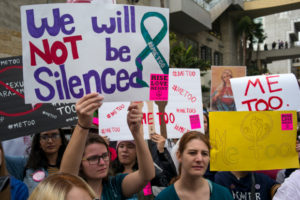In today’s Wall Street Journal “Sightings” column, I take a look at recent pushback against the #MeToo movement. Here’s an excerpt.
* * *
Peter Martins, the longtime boss of New York City Ballet and the School of American Ballet, abruptly retired in December in the wake of allegations that he had subjected dancers to sexual harassment and verbal and physical abuse. Two weeks ago, NYCB and SAB announced that an investigation conducted by an outside lawyer “did not corroborate the allegations,” which Mr. Martins had already denied. Several dancers claim that the investigation was biased in his favor, and the lawyer’s report will not be made public. In any event, Mr. Martins is not returning to his posts, and NYCB and SAB have since put into place measures meant to make it easier for their employees to report inappropriate conduct.
 What effect will all this have on the #MeToo movement? Over the past six months, the #MeToo-ers have exposed the entertainment industry as a stinking sewer of predation, in the process changing for the better our collective standards for acceptable behavior in the workplace. But a pushback has begun, and Mr. Martins’ ambiguous exoneration may increase its momentum.
What effect will all this have on the #MeToo movement? Over the past six months, the #MeToo-ers have exposed the entertainment industry as a stinking sewer of predation, in the process changing for the better our collective standards for acceptable behavior in the workplace. But a pushback has begun, and Mr. Martins’ ambiguous exoneration may increase its momentum.
The most prominent critics of the #MeToo movement think that to insist on always “believing the victim,” one of its tenets, necessarily puts the principle of due process at risk. One of them is President Trump—himself an alleged abuser—who tweeted as follows: “People[‘]s lives are being shattered and destroyed by a mere allegation.” Other, less controversial critics like Emily Yoffe contend that casual workplace remarks with ill-judged sexual overtones are being treated in a zero-tolerance manner inappropriate to the gravity of the offense, and that it may be wrong to judge older offenders by new standards of conduct without making allowance for their age.
For my part, I believe that the effects of #MeToo have been hugely salutary. Given what we’ve learned about the disgusting behavior of the likes of Harvey Weinstein, Louis C.K. and other offenders whom the movement has helped to bring low, how can anyone think otherwise? Still, it’s one thing to give credit where it’s due and another to assume that all accusers can do no wrong….
* * *
Read the whole thing here.
